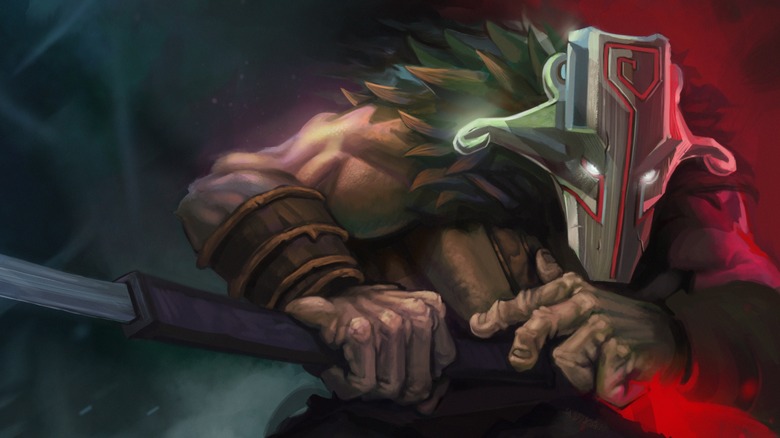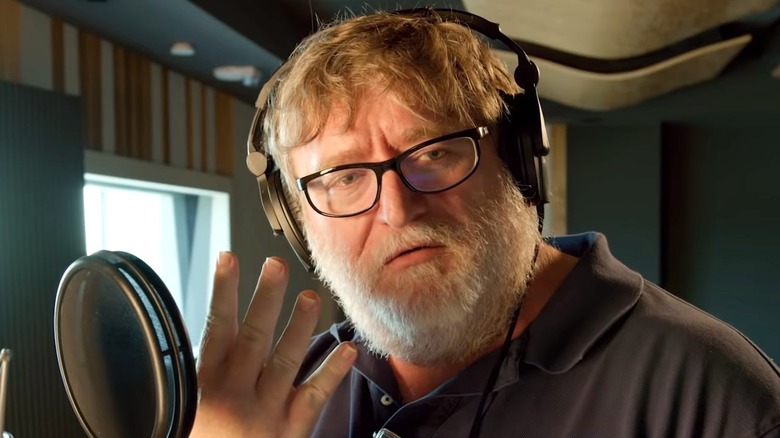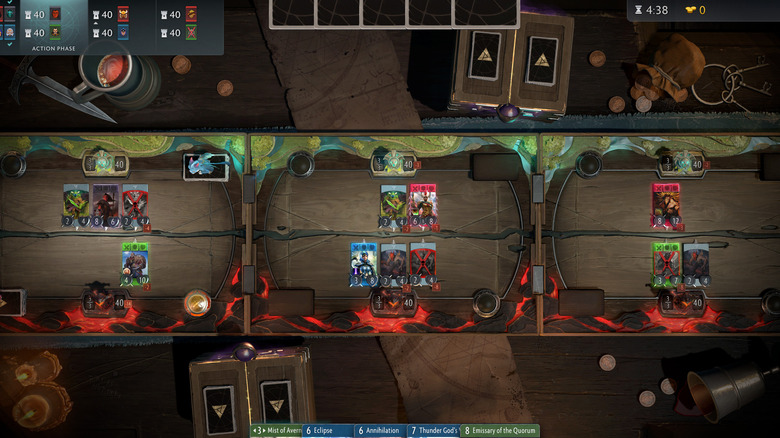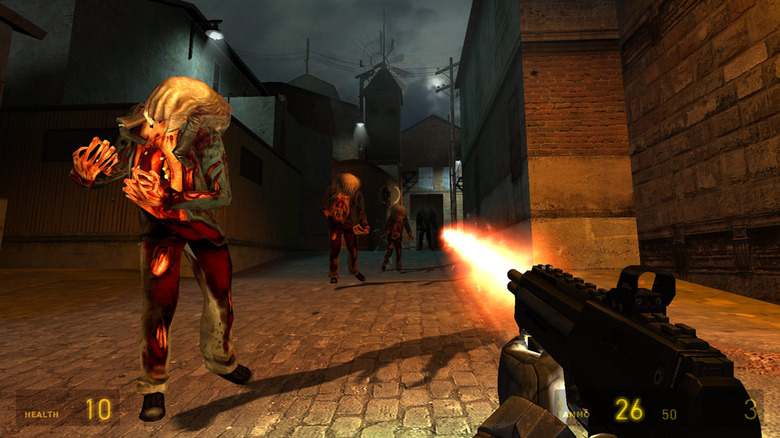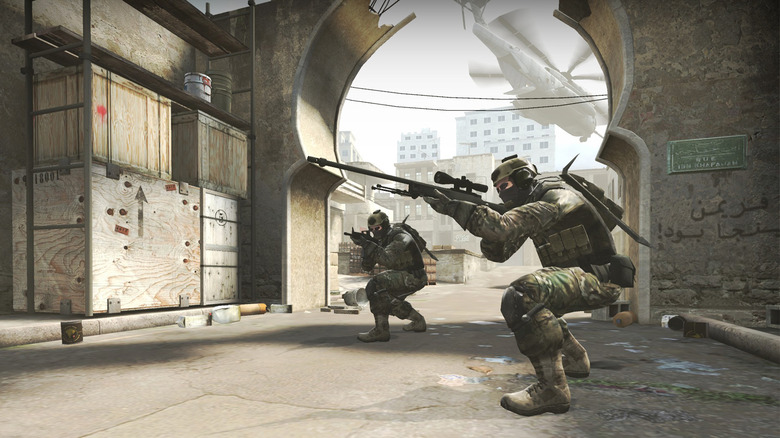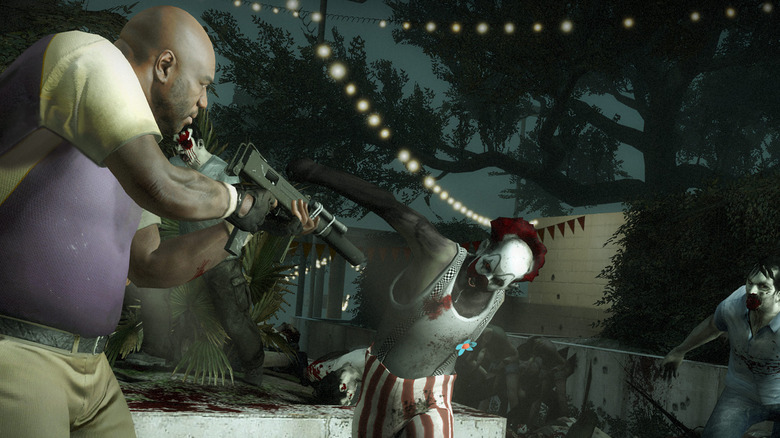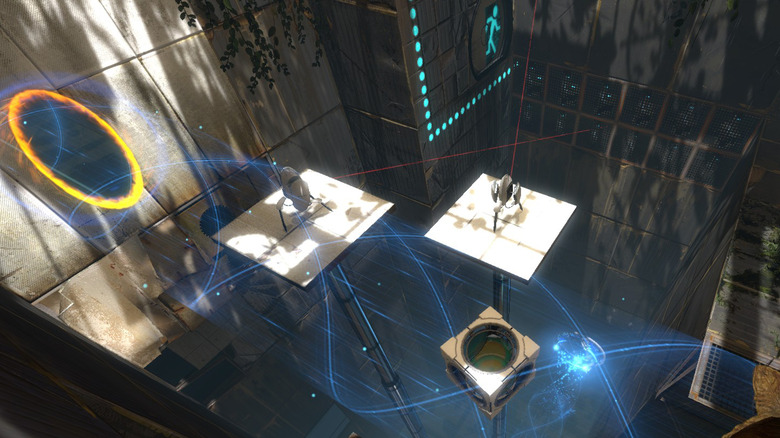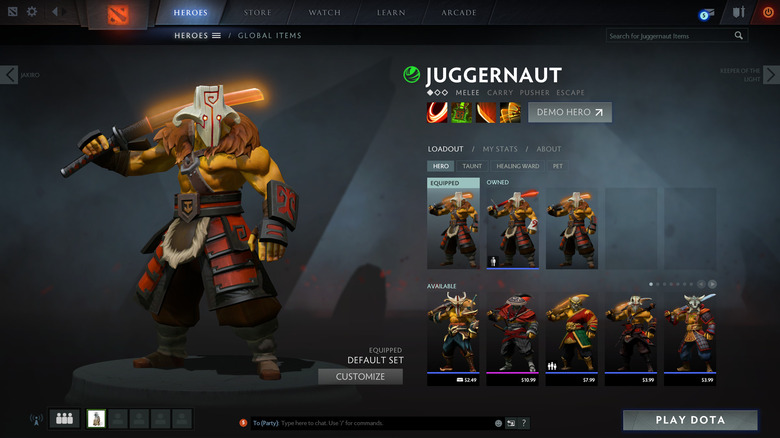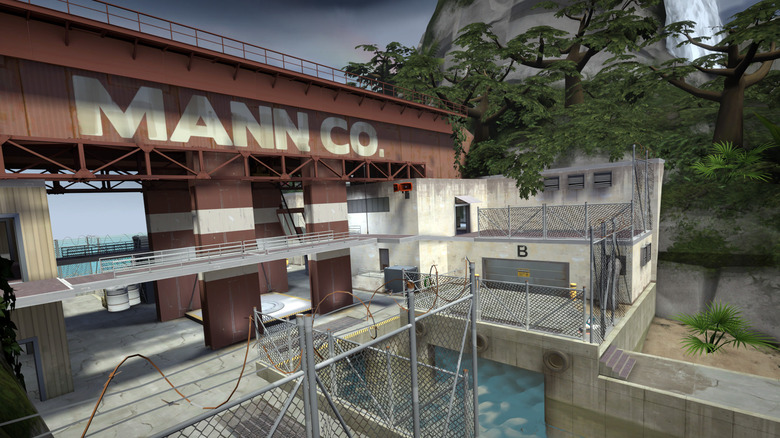The Untold Truth Of Valve Corporation
Steam. Summer Sales. GABEN. If you're a PC gamer, you are almost certainly a part of the stranglehold that Valve has on the industry. Steam was a big gamble for the company to take back when it released in 2003. In the time since its release, it has practically taken over the PC gaming market, with only the rare Fortnite, Blizzard game, or League of Legends succeeding without releasing on Valve's service.
Despite their massive success and near omnipresence on the PC gaming scene, Valve is extremely secretive about their games and upcoming plans for Steam. This has helped to build their mystique, but it has also caused some problems when Valve has made a decision that doesn't sit well with fans. Today, we're going to take a look at some of the things that not as many people know about the makers of our favorite digital storefront.
Strap yourselves in for the untold truth of Valve Corporation, and hold onto your wallets. There's probably a Steam sale just around the corner.
Gabe Newell is worth nearly $4 billion
Steam makes an awful lot of money, and CEO Gabe Newell reaps a lot of those benefits. As Valve is not a publicly-owned company, they don't have to release their financial earnings, but there are some pretty staggering estimates out there about just how wealthy Valve's CEO is.
Forbes put their highest estimate for Newell's wealth at $5.5 billion in 2017. That has dropped a bit as of the time of this writing: their "real-time" estimate for Newell's wealth currently sits at $3.9 billion. Paltry.
Keep in mind, these are only wealth estimates, but it sounds like Newell is sitting pretty with what Valve is currently doing.
Forbes' estimate places him in elite company: just inside the top 100 wealthiest Americans, the top fifty richest in tech, and #334 on the global billionaires list. Not bad for a college dropout.
Artifact is Valve's first major game release since 2013
Valve is still seen, primarily, as a software development company. After all, they're the company who helped create juggernauts like Dota 2, Counter-Strike, Half-Life, Team Fortress 2, and Portal. Amazingly, the upcoming Artifact is the first big software release from the company since 2013, when Dota 2 finally left its "beta" classification. Even still, that game had been around in some form for a few years at that point. What was Valve doing in all that downtime?
For one, they had two major hardware releases: Steam Machines (which began development in 2013 but were not released until 2015) and co-development of the HTC Vive virtual reality headset, which released in 2016.
For another, it doesn't seem as if Valve really needed to release games in that time to stay afloat. Dota 2 and Counter-Strike are still some of the biggest moneymakers on Steam, not to mention the fact that Valve takes a cut of everything sold in their digital storefront. However, it will be nice to see Valve get back to game development, as they have a pretty stellar track record.
Valve took a gamble with Half-Life 2's release
Believe it or not, there was a time when Steam was not installed on everyone's PC. Valve took a bit of a gamble by packaging their online storefront with copies of 2004's hotly anticipated Half-Life 2. It was not like the fiascos that we've seen with some modern PC "online all the time" releases like Diablo 3 or SimCity, but just a (seemingly) friendly "anti-piracy" check at installation. After Half-Life 2 was installed, players were free to play the game offline without a problem.
But Steam would be on your system, and then it was only a matter of time.
Polygon summed it up well in their breakdown of the "Anti-good guy Valve" idea: "Remember that even the retail version of Half-Life 2 required the installation of Steam, which means that any store that sold PC software was selling you their doom with every copy of the game."
As Valve worked out the kinks in their storefront and players started to buy into the idea of Steam, the company quickly cornered the market and began to choke out their competition. Nowadays, it would be difficult to be a PC gamer without Steam. Although they don't need to disclose their financial information, Forbes estimated that the company made over $1 billion in 2010 just from game sales on Steam.
Many of Valve's biggest successes started as mods
Although Valve is, no doubt, a talented development studio, what truly seems to set them apart from other developers is their ability to identify gaming trends and seize on them. Rarely does that stand out as well as it does with how many successful mods they have adapted and crafted into even bigger projects. Valve's three most-played games on Steam all began as mods for different games. Valve purchased the mods, hired the developers, and helped shape gaming through those different products.
Counter-Strike is one of the oldest esports out there, and it began as a mod for another Valve title: Half-Life. Team Fortress began as a mod for Quake, adding class-based warfare to the popular arena shooter. And Dota 2 began as a mod called Defense of the Ancients, which was originally created in Warcraft 3.
These games obviously would not have become what they have if it weren't for Valve, but it remains fascinating how well Valve has optimized popular mods to take them to the next level.
Valve has been described as a "high school"-like environment
Even though Valve is incredibly secretive about their practices, doesn't it just seem like a fun place to work? Video games, plugged into the gaming community, and a near impeccable release record? Heck, take a look at their employee handbook, which leaked in 2012. It's full of bizarre illustrations and humorous graphs — how could it not be a blast to work there?
Funny you should ask that: one former employee claims that the "leaked handbook" stunt is Recruiting 101. And it certainly seems like he thinks Valve was NOT a fun place to be.
Granted, we don't know for a fact that former Valve employee Rich Geldreich was actually talking about Valve when he went on a tweetstorm in 2018 about the awful working conditions at a company he used to be a part of. However, PC Gamer makes a pretty compelling case that he is, indeed, speaking about the house that Newell built. Geldreich describes a bizarre level of surveillance, a cutthroat workplace full of gossip and backstabbing, and powerful in-house "barons" who could make or break new employees based on a whim.
Overall, it sounds like a nightmare of a job, provided that it was, in fact, Valve that Geldreich was describing. But hey, sandviches, right?
Valve is making progress in bringing Steam to the world's biggest country
China has the largest population on Earth, so it makes sense that Valve would want to expand Steam into the country. The store is available, but Verge writes that it is in an unofficial capacity that could be blocked by the government's strict censorship agency at any time. Much of Steam's other content — communities, user profiles, inventories — are all blocked in China.
A partnership with massive Chinese gaming company Perfect World is paving the way for Steam to become much better optimized in the country. PC Gamer writes that Perfect World already held the rights to publish Valve's Dota 2 and Counter-Strike: Global Offensive in China, allowing it to compete with another massive Chinese gaming company, Tencent. Tencent owns Riot Games (League of Legends) and forty percent of Epic Games (Fortnite), but a partnership with Valve would help Perfect World gain some serious ground in the Chinese gaming market.
One thing that will be interesting to watch out for with Steam officially available in China is that will force games on the platform to adhere to censorship laws in China. It remains to be seen how many games become available there and how Valve will handle that level of scrutiny.
Valve is making a play into the streaming industry
Just like Valve's Steam service dominates the digital storefronts of PC gaming, there is only one name in livestreaming that means much of anything: Twitch. Steam has offered the ability to stream games since 2014, but it lacked the slick interface and built-in audience of Twitch's platform. Like much that Valve does, their early foray into broadcasting may have only been a test run; it now appears they are making a play at the big leagues.
Steam.tv is that play, and it seems to be a one-stop shop for streaming all of Valve's most popular esports titles. PC Gamer reports that the site first appeared during 2018's International Dota 2 tournament, although it debuted earlier than it should have and was promptly taken down. The site appears to be up permanently at this point, although it still does not have much of an interface. There will reportedly be chat integration and plenty of esports competition, although how it will compete with Twitch remains to be seen (if that is even Valve's true intent with the service).
Valve isn't sure how to handle adult content on Steam
For all the savvy moves Valve has made with Steam, the company has run into its fair share of controversies as well — and few stand out quite as much as how they've handled sexually explicit content on their platform. Obviously, sex plays a role in games like The Witcher 3 and Mass Effect, but more explicit games have had a roller coaster ride on Steam. Here's how it has played out, and be aware that this could completely change next week.
In May 2018, Steam cracked the whip on sexually explicit games, telling several developers they needed to censor their games or face removal from Steam. Those companies told PC Gamer that Valve accused their games of featuring pornographic content, despite that not being the case. Due to the outcry, Valve announced they would no longer police the games on their service at all, outside of legal issues or obvious "trolling" games. More backlash ensued.
IGN writes that, in September 2018, Valve rolled out an "Adults Only" filter for Steam that could keep games with pornographic material out of the hands of children.
In mid-September, Steam's first uncensored adult game, Negligee: Love Stories, was approved for release on the platform. It will be interesting to watch how this situation continues to develop, and whether or not Valve can remain hands-off when companies naturally try to push the envelope.
Steam's refund policy stems from an Australian lawsuit
Remember when Steam instituted their refund policy? Variety writes that, before 2015, Valve offered refunds for digital products on Steam on a "case by case basis." It seems likely that the refund policy changed to have greater reach as Steam continued to grow into a worldwide company, as a massive lawsuit against their refund policy cost the company millions of dollars.
According to PC Gamer, Australian consumer law dictates that all products sold in the country, whether they are physical or digital, must be eligible to return for a full refund. Since Valve's policy was different at the time, the lawsuit stated that the company was not following Australian law. Valve, naturally, kept trying to appeal the ruling after the lawsuit did not go in their favor.
However, in 2018, Valve lost their final appeal of the court case and were forced to pay up. The suit was for $3 million Australian dollars, which equates to about $2.3 million USD. Currently, Valve offers full refunds under certain conditions, without any approval necessary.
Valve is the main culprit in bringing loot boxes to the West
Loot boxes have become an inescapable aspect of modern gaming (although, luckily, it seems like they are losing that fight in some corners of the globe). Like a lot of massive gaming trends, we have the geniuses at Valve to thank for this particular blight, or at least for transporting that blight to the West.
US Gamer writes that, while the idea of loot boxes truly began in Chinese and Korean MMORPGs, Team Fortress 2 was actually the first Western game that embraced the idea. The game went free-to-play in 2010, after the huge "Mann-conomy" update introduced loot drops and crates to the game. PC Gamer writes that Gabe Newell stated the switch to free-to-play — only made financially possible by adding the loot boxes — multiplied the player base of TF2 fivefold, and they have never looked back.
You can hardly shake a stick at a game anymore without some form of "free" cosmetics dropping or a variety of loot box options being made available. Luckily, this strange form of legalized gambling seems to be slowly phasing out as more countries put the kibosh on loot boxes.

